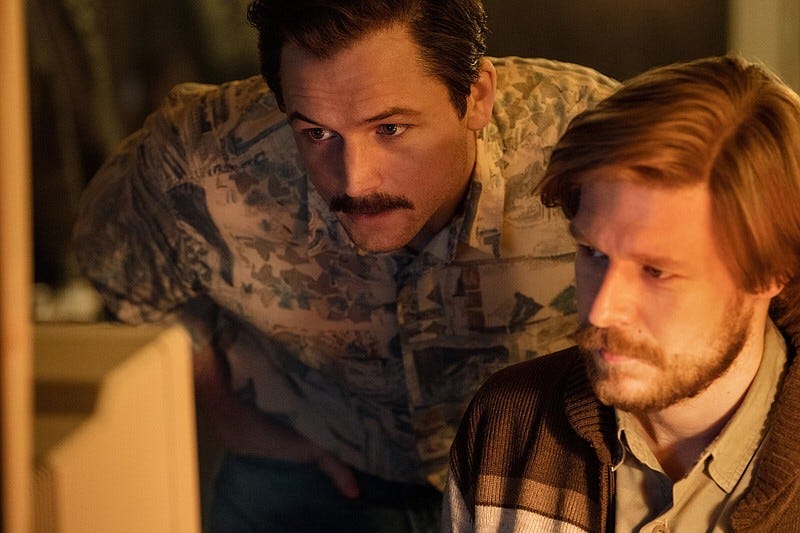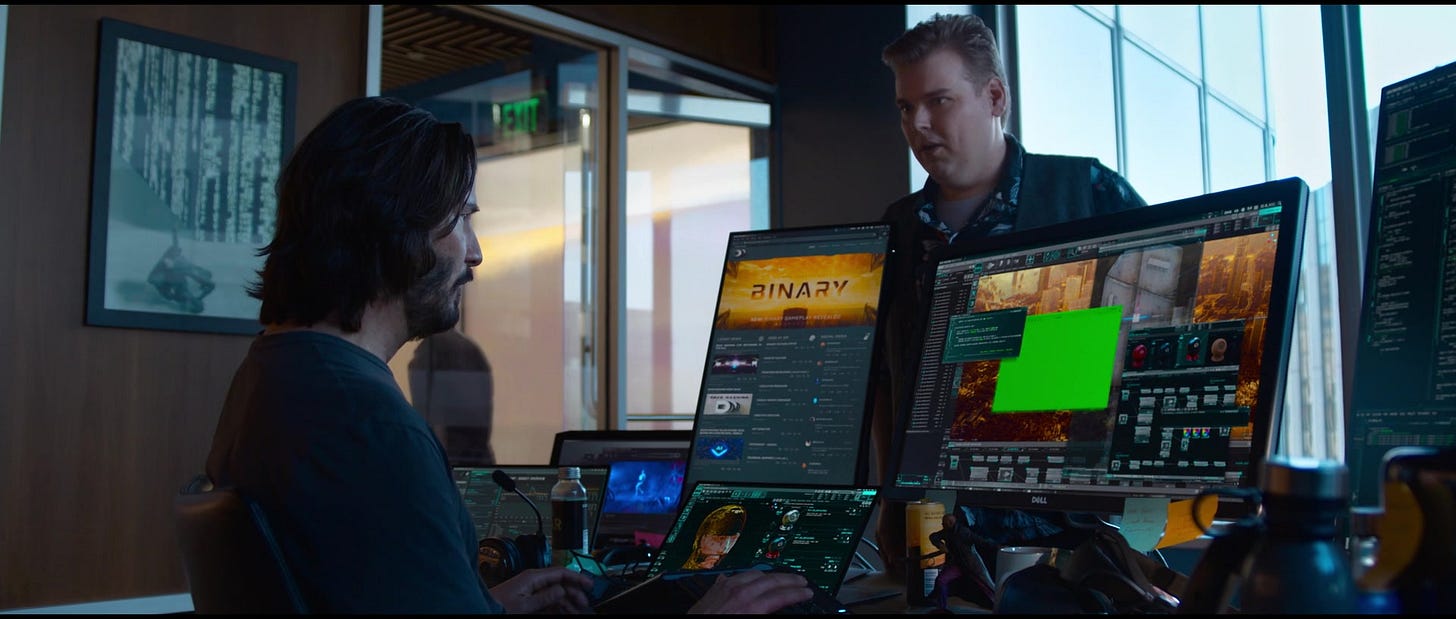Could the game development be a good story to tell?
Being a game developer is my dream job, so talking about my job is usually a pleasure. There is one exception though – it’s the moment I need to talk about what game designer actually does.
Don’t get me wrong—talking about games with people who aren’t familiar with my profession often leads to interesting reflections. However, explaining how games are created and assuring for the thousandth time that despite working in the video games industry, I’m NOT a programmer gets really dull after it repeats almost every time – even when talking with people who know and play video games.
Yes, I envy movie directors, scriptwriters, musicians, and writers—people generally have an idea of what they do. What helps in recognition of such professions is that they aren't afraid to tell stories about themselves: films about films are pretty often phenomena. The same goes for writers or musicians whose lives are shown in all sorts of different mediums.
But game developers? Judging by how rarely pop culture used to cover this topic, the game-making process seemed uninteresting for a story.
Or maybe — nobody has yet found an interesting angle to talk about this new medium?
After I read Tomorrow, and Tomorrow, and Tomorrow, I know that it’s possible to use a game development topic to tell a universal story that could be moving even for people who don’t know much about games.
Gabrielle Zevin's book is about ambition, creativity, and complicated relationships that cannot be easily labeled. It's also about video games that the two main characters—Sam and Sadie—create. Their games' success brings them fame, money, and—occasionally—satisfaction. However, it's also the root of envy, quarrels, and selfishness.
In this story, video games don't just serve as a unique background. You can easily see that games aren't just a random topic for Gabrielle Zevin but something she knows inside out. Her characters spend childhood with The Oregon Trail, get excited to play a beta of the new Metal Gear or wonder why Donkey Kong wears a tie.
In the book, game development is dramatized but still believable and relatable. When Sam and Sadie give the first level for their friend to play, they hear what most developers hear in such a situation – it is too difficult! When head creatives in the project grow apart and work separately on "their half” of the game, they create a disappointing game with unclear vision. When they need to make a quick sequel for a breaking hit to satisfy the publisher and make more money, they risk burnout and produce an uninspired follow-up.
All of these situations may resonate with the experiences of actual game developers—even if they aren't as famous or successful as those fictional characters or don't publish games as fast as them (this is my only beef with the book; it’s frustrating to see how often they ship a new game when, in reality, you may spend years without getting any new game released).

But what I liked the most about Tomorrow is how this book uses games as a metaphor for saying something meaningful. There is a scene in which Ms. Pac-Man is an excuse for a mother and her son to talk about death. Reflection on how Hideo Kojima shows female characters in Metal Gear Solid is juxtaposed with a breakup with the toxic man. The fictional games Sam and Saide designed reveal something about their personal anxieties and dreams.
There are a few more philosophical reflections about the nature of games, like this one:
"What is a game?" Marx said. "It's tomorrow, and tomorrow, and tomorrow. It's the possibility of infinite rebirth, infinite redemption. The idea that if you keep playing, you could win. No loss is permanent, because nothing is permanent, ever. "
Tomorrow... is "the million copy bestseller," according to its publisher. The movie adaptation rights are already sold. Although, the single book probably cannot change the general pop-cultural perception of game development, it’s an important step.
The film industry also has a growing interest in showing the work of game developers. In 2023, the Tetris movie was released, and thankfully, it isn't an adaptation of falling bricks gameplay but "the story of how one of the world's most popular video games found its way to players around the globe." It focuses on pursuing publishing rights for this groundbreaking game made in the Soviet Union. It’s a dynamic and exciting movie that even has a car chase sequence on the streets of Moscow! However, what’s most important is that it also shows the person behind this game - Aleksiej Pażytnow – and his passion for the act of creation. The scene in which he meets another designer and they start to iterate on the Tetris prototype shows how joyful and satisfying the work on games can be.
Game development could also serve as a canvas for comedy: Mythic Quest TV series is about a video company that tries to keep its MMO game on top despite the enormous ego of its game director, the overgrown ambitions of its lead programmer, or greed coming from the monetization head. It does not always hit all the right notes, but it's difficult not to like the main characters. Besides, one of the episodes called A Dark Quiet Death (s01e05) is pure genius, worth watching even completely separately (it's a short, standalone story that serves as a prequel to events in the main storyline).

Making a main hero a game developer allows for going meta or breaking the fourth wall. This trick was used in Black Mirror's Bandersnatch or The Matrix Resurrections, where Neo lives in the Matrix again, but now as a game designer. Similar topics can be found in the Westworld TV series, eXistenZ by David Cronenberg, and probably a bunch of other movies (including those that aren't out yet).
Okay but what does it give us, game makers? Seeing somebody of your profession on the TV is nice, but is that even important?
Yes, I think so.
It makes our job easier to understand by the audience and helps them recognize that games are made by a bunch of individual creators, not faceless corporations. The video game is not made by EA, Ubisoft, or 2K but by Monica, Alex, Greg, Robert, or Anna. Even mainstream blockbuster games made by 1000+ teams have elements that are a result of the sheer passion of individuals.
That matters because we need more personal relations with the audience. It doesn’t sound good in the age of internet hatred, but I’m talking about something more positive and real. Game developers rarely experience direct contact with people who enjoy their work. Not many of us have ever had the opportunity to hear a standing ovation from a room full of people – even if our game is enjoyed by thousands or millions of players!
Watching streams or reading comments doesn’t give the same energy as an actual conversation with a real person, which is positively impacted by your work. Naturally, this comes from the digital nature of games, but even an email or message that comes personally from a fan of the game and shows that our work means a lot to this particular human being might make us feel that all of this is worth our efforts.
Stories about game development won’t immediately change it, but hopefully, they will bring more attention and understanding of the developers' perspective.
Speaking of which, those stories can allow game creators to change their perceptions about their jobs. In mundane reality, it’s easy to forget how extraordinary what we do is. We’re getting paid for creating fictional worlds filled with our rules and ideas. Someday in the future, somebody will immerse themselves in them and, hopefully, have a wonderful time.
We should cherish and celebrate acts of creation, not only the results, such as applause, popularity among players, or financial success.
We might also gain the courage to tell the world about our process. Then, maybe we will start creating more games about ourselves, exploring the capabilities of our medium, and self-analyzing our creations.
Like Beginner’s Guide does. The game is a follow-up to the famous The Stanley Parable, but instead of analyzing the game medium by itself as its predecessor, it focuses on WHO created it. It's narrated by its main developer, Davey Wreden, who shows and describes a collection of short games made by Coda, supposedly his friend. Reality and fiction get all mixed up in this dark and personal story.

I cannot even describe The Beginner’s Guide in detail without realizing that I fell into a trap set up by the message of this game. I just don't want to be like the narrator of this game, overanalyzing art created by somebody else only to feel smart about himself. Play Beginner's Guide if you like to experience that for yourself. I don’t know a better game about creating games (or even creating any piece of art).
But despite all my love for Davey Wreden’s work, I hope that someday I'll play an even better one.





